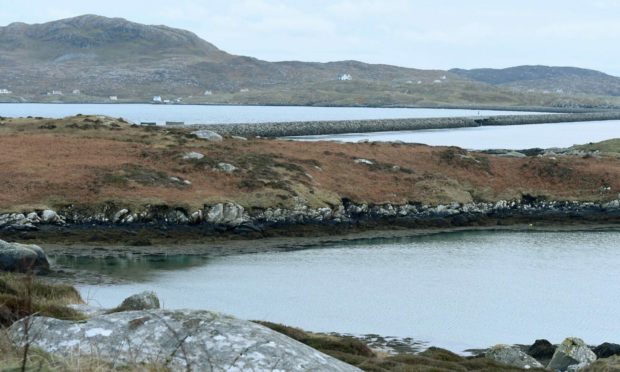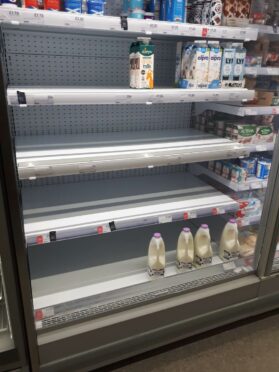People in the Western Isles have been asked to “only buy what you need” following a shortage of milk across the islands.
The Co-op say the issue is down to an industry-wide shortage of HGV drivers and an increase in staff self-isolating.
As a result, milk is being rationed in the Outer Hebrides in efforts to ensure everyone has a fair share of the supplies.
Customers in South Uist have been told they can only purchase one bottle of milk per visit, with Tracey Heyes, manager at the Daliburgh Co-op pleading with residents to “only buy what you need”.
‘Please think of the whole community’
She said: “All retail currently has a shortage of lots of food stuffs including milk.
“We are getting delivery daily however it’s very limited, this is due to there being a shortage of drivers to deliver the goods to the warehouse in order to get them to the stores.
“If everyone can please just think of the whole community and only buy what you need so everyone can get some, we will be limiting the amount of milk to one per person until this situation improves.”
Despite the rationing, shoppers still reported being greeted with empty refrigerators in shops in Creagorry while some said there was a limited supply in Sollas.
But it is not just the islands who are suffering due to the lack of lorry drivers as empty milk fridges have been seen across the country, with photos surfacing of an empty fridge in an Angus Co-op.
Fears have also risen for pubs in Scotland who have also been affected by the reduced deliveries.
The Scottish Licensed Trade Association (SLTA) has reported issues facing suppliers Greene King, which owns Belhaven, and Heineken – with issues affecting packages of bottes and cans as well as kegs.
However Colin Wilkinson, SLTA managing director, told BBC Scotland that deliveries of carbon dioxide and nitrogen gas were of more concern.
Last month sweet giant Haribo also revealed it was struggling to get stocks to stores across the country due to the shortage of lorry drivers.
The German confectionery business said it was “experiencing challenges with regards to the nationwide driver shortage” but that they were “working with partners across the food and drink industry to address and respond to this problem.”
The Road Haulage Association (RHA) believe that there is currently a shortfall of about 60,000 drivers – which has led to the shortages.
Around 30,000 HGV driving tests didn’t take place last year due to the pandemic.
Shortfall of drivers
Typically, 72,000 candidates train to become HGV drivers, with 40,000 passing. But only 15,000 were able to complete training last year, the RHA reported.
Brexit is also believed to have played a part in the lack of drivers, with the RHA saying that many drivers are unsure of their rights to work in the UK.
In a letter to the prime minister, the organisation warned that many drivers also returned to their country of origin during extended periods of lockdown and restricted travel, with the vast majority not returning.
Since then, the government has launched a consultation into proposed changes to the way HGV drivers are tested in efforts to speed up the process.
Speaking of the shortages, a Co-op spokesman said: “We are experiencing sporadic disruption from the industry-wide shortage of HGV drivers and an increase in colleagues self-isolating on a precautionary basis.”

